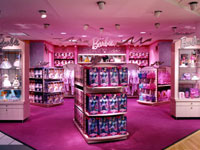First Barbie entertainment theme store produces scoop
An excellent idea came to Tito Loizeau three years ago: A new Barbie-themed store will attract little girls and their parents' money will follow.

Loizeau's marketing company had set up a small "House of Barbie" promotion for Mattel Inc. inside the mall. He was astounded by the reaction: Girls waited for hours to get in, and mothers made offers on clothes he'd hung up for decoration - never mind that they didn't have anything to do with Barbie.
"It would be a pink shirt you could buy anywhere in the mall," Loizeau said, "But they'd want the shirt because it was associated with Barbie."
So he set out to open the world's first Barbie "fashion-tainment" store, where girls can get glittery hairdos and make up at the Barbie beauty parlor or try on gowns and play with dolls in the Barbie playroom, all while their parents nibble pink-frosted desserts in the Barbie cafe.
Loizeau, 37, spent a year persuading El Segundo, California-based Mattel to license the idea. Then he and two associates put up US$500,000 (€340,000) of their own money to open the "Barbie Store."
Loizeau's group has exclusive rights to the Barbie Store license in Argentina, Uruguay and Paraguay, plus first-option rights in the rest of Latin America. Mattel gets a percentage of sales and the right to expand the concept anywhere else worldwide.
The store opened in September and now Buenos Aires' chic Palermo neighborhood, home to swank restaurants, boutiques and tony townhouses, is all abuzz with Barbie.
While some parents may bemoan Barbie's conspicuous consumption and her particular image of womanhood, she appears have plenty of adoring fans in the Argentine capital.
"There are girls who come every single day," Loizeau said. "No one understands it."
The US$7 (€5)-an-hour playroom inside the store has toys and dolls, costumes, make up and jewelry, and a small catwalk for girls to parade on under disco lights. The store also includes a beauty salon, where girls can get everything from a glamorous hairstyle to a painted butterfly on a cheek, plus a coffee shop. And the Barbie playroom is available for parties, starting at around US$650 (€440).
A few Barbies are for sale, but selling dolls isn't the retail focus of the store. Instead, there are T-shirts, skirts, pants and handbags - most in shades of pink - that are designed and made in Argentina and only available at the Barbie Store. The items sell for 10 percent more than similar clothes at other stores without the Barbie logo, Loizeau said.
While Loizeau's original idea was to sell glamorous Barbie outfits in kid sizes, focus groups showed mothers were not so keen - even if the girls themselves might have loved the idea. Instead, he commissioned a line of basic kids clothing that comes with matching items for dolls.
"It's OK for them to dress up like Barbie for a couple of hours," Loizeau said, "but when they go home, they're still little girls."
The clothing line initially targeted girls 3 to 9, but Loizeau said they added bigger sizes after girls as old as 16 came in wanting Barbie clothes. His group may branch into adult clothing.
The store's revenue topped projects by 40 percent, Loizeau said, although he keeps his financial figures private.
Now he and his partners are planning to secure outside funding to start opening stores in other cities in the region.
The Argentine store is the latest Barbie-related licensing venture for Mattel, the world's largest toy maker, which has struggled with several high-profile recalls this year involving Chinese-made toys. Over the past few years, Mattel has licensed clothing shops in Asia, organized Barbie fashion shows, and started a Barbie online community for girls.
"We've done a lot of work to maintain Barbie's relevance by extending her into other parts of a little girl's life," said Mattel's Richard Dickson, who oversees non-toy extensions of the Barbie brand.
Barbie, which first sold in 1959 and is still the world's No. 1 fashion doll, is evolving into something of a "lifestyle brand," said independent toy analyst Chris Byrne of Byrne Communications, Inc.
But Byrne said Barbie Store is unlikely to take off in the United States. "You might see a Barbie boutique within a department store, but you're probably not going to see a stand-alone store."
Although Mattel subsidiary American Girl has been successful with U.S. stores offering cafes, photo studios and doll hair salons, American Girl sells its dolls directly, whereas Barbies are available at competing retail stores.
"If Mattel suddenly goes into competition with its established channels of distribution, it's going to add a lot to cost and not to profitability," Byrne said.
Loizeau said his store promotes the Barbie brand without competing directly with doll retailers. "We're not a toy store," he said. "Girls play here and then they want a Barbie."
And judging from the reaction in Buenos Aires, it seems to be working.
"The only bad thing is there's nothing for boys," said Liliana Benifes, as her 3-year-old daughter played in the Barbie room.
The playhouse was an unexpected hit. Loizeau said he had initially expected 20 or 30 girls a day, but some days the "Casa de Barbie" gets as many as 150 children.
"When the time is up, they ask their mothers for another hour," Loizeau said. On Saturday afternoons, he added, "it's chaos." And when there's a birthday party, some girls "get angry that they can't go in, and they throw tantrums."
Subscribe to Pravda.Ru Telegram channel, Facebook, RSS!


